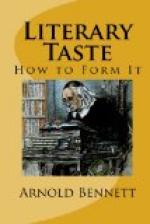CHAPTER VI
THE QUESTION OF STYLE
In discussing the value of particular books, I have heard people say—people who were timid about expressing their views of literature in the presence of literary men: “It may be bad from a literary point of view, but there are very good things in it.” Or: “I dare say the style is very bad, but really the book is very interesting and suggestive.” Or: “I’m not an expert, and so I never bother my head about good style. All I ask for is good matter. And when I have got it, critics may say what they like about the book.” And many other similar remarks, all showing that in the minds of the speakers there existed a notion that style is something supplementary to, and distinguishable from, matter; a sort of notion that a writer who wanted to be classical had first to find and arrange his matter, and then dress it up elegantly in a costume of style, in order to please beings called literary critics.
This is a misapprehension. Style cannot be distinguished from matter. When a writer conceives an idea he conceives it in a form of words. That form of words constitutes his style, and it is absolutely governed by the idea. The idea can only exist in words, and it can only exist in one form of words. You cannot say exactly the same thing in two different ways. Slightly alter the expression, and you slightly alter the idea. Surely it is obvious that the expression cannot be altered without altering the thing expressed! A writer, having conceived and expressed an idea, may, and probably will, “polish it up.” But what does he polish up? To say that he polishes up his style is merely to say that he is polishing up his idea, that he has discovered faults or imperfections in his idea, and is perfecting it. An idea exists in proportion as it is expressed; it exists when it is expressed,




